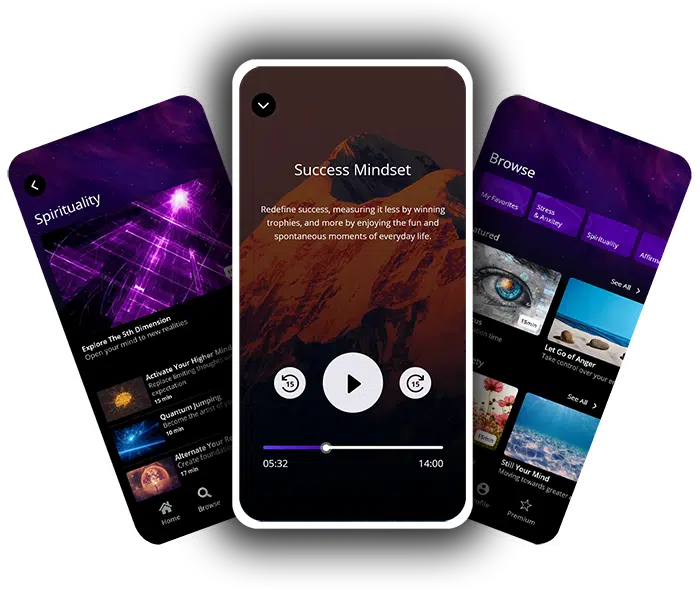Are you struggling with morning anxiety and finding it challenging to start your day on a positive note? Do you often feel overwhelmed and stressed out before you even leave your bed? You’re not alone. Many people experience morning anxiety, but the good news is that there are ways to reduce it and find peace. This article will provide the top 10 tips to reduce morning anxiety and start your day feeling calm, centered, and ready to take on the world.
Try this guided meditation to help with the feeling of anxiety right away!

Unleash Your True Potential!
Explore the world of meditation with our powerful guided sessions crafted to bring peace and strength to your spirit.
But first, let’s ensure our sessions are the perfect fit for you.
Take our short quiz to find out!
Table of contents
What is Morning Anxiety

Morning anxiety is a feeling of fear, dread, or unease that is experienced upon waking up in the morning. It is a very common condition that affects many people, and various factors, such as stress, depression, or generalized anxiety disorder, can cause it. Morning anxiety can make it challenging to start your day and negatively impact your mood, productivity, and overall well-being.
Common Causes of Morning Anxiety
There are many potential causes of morning anxiety, including:
- Stressful life events, such as work deadlines, financial worries, or relationship problems.
- Cortisol awakening response (CAR) can also be the reason. But many people may feel a lot more stressed after 30 to 45 minutes of waking up than usual.
- Anxiety disorders are the obvious cause, such as generalized anxiety disorder or panic disorder.
- Depression or other mental health conditions.
- Hormonal imbalances can also be the reason, such as those caused by menopause or thyroid problems.
- Poor sleep quality or sleep disorders, such as sleep apnea or insomnia.
The Negative Effects of Morning Anxiety
Morning anxiety can have a range of negative effects on your daily life, including:

- Reduced productivity and motivation throughout the day.
- Difficulty concentrating and making decisions.
- Negative impact on your relationships with others.
- Physical symptoms such as headaches, nausea, and fatigue.
- Increased risk of developing other mental health conditions, such as depression or anxiety disorders.
Top 10 Tips to Reduce Morning Anxiety
If you’re struggling with waking up with anxiety or morning anxiety, there are a lot of things you can try in order to reduce it and find peace. Here are our top 10 tips:
1. Get Enough Sleep
Sleep deprivation can have a big impact on your level of stress and anxiety in the morning. One of the most vital things you can do to reduce morning anxiety is to get enough sleep. Aim for 7-8 hours of sleep per night and establish a consistent sleep schedule. This can help re-balance your body’s natural sleep-wake cycle and reduce feelings of stress and anxiety.
Related: 7 Best Light For Meditation Room Lighting – Creating A Calm Atmosphere
2. Plan Your Morning Routine

Having a structured morning routine can help reduce feelings of anxiety and overwhelm. Plan your morning activities the night before, and stick to a consistent pattern. This can help you feel more in control and prepared for the day ahead.
3. Practice Mindfulness
Mindfulness is a powerful technique for reducing anxiety and promoting relaxation. Take a few minutes each morning to practice mindfulness and meditation techniques such as deep breathing or yoga. Meditation, along with other therapies, can help calm your mind and reduce feelings of stress and anxiety. If you are new or a beginner in meditation, apps such as Enhanced Meditation can help a lot. It is a free meditation app with a big library of free yet high-quality guided meditations.

Unleash Your True Potential!
Explore the world of meditation with our powerful guided sessions crafted to bring peace and strength to your spirit.
But first, let’s ensure our sessions are the perfect fit for you.
Take our short quiz to find out!
4. Exercise Regularly

Regular exercise is a great way to reduce anxiety and promote overall well-being. Aim to get at least 30 to 45 minutes of moderate exercise each day, such as walking, running, or cycling. Exercise can help reduce stress and anxiety, boost mood, and improve sleep quality. Another option is to combine exercise and meditation practice together. That way, you can benefit from both without needing extra time to practice them apart.
5. Eat a Healthy Breakfast
Eating a healthy breakfast reduces morning anxiety and promotes overall health. Aim to eat a breakfast high in protein and healthy fats, such as eggs, avocado, or Greek yogurt. Avoid sugary or processed foods, which can cause blood sugar spikes and crashes that can contribute to feelings of anxiety. Learn how to practice mindful eating here: How to Practice Mindful Eating: 8 Steps for a Healthier Lifestyle
6. Avoid Stimulants
Stimulants such as caffeine and nicotine can contribute to feelings of anxiety and exacerbate morning anxiety symptoms. If possible, avoid or limit your intake of these substances, especially in the morning. Instead, try drinking herbal tea or decaf coffee to help promote relaxation.
7. Listen to Soothing Music

Listening to relaxing, calming and soothing music can help reduce anxiety and promote relaxation. Create a playlist of your favorite relaxing songs and listen to them each morning as you prepare for the day ahead.
8. Talk to Someone
If you’re struggling with morning anxiety, talking to someone about your anxious feelings can be helpful. This could be a trusted friend, family member, or mental health professional. Talking about your anxiety can help you process your feelings and find strategies for managing them.
9. Write Down Your Worries

Writing down your negative thoughts, worries and anxieties can be a very helpful way to process your emotions and reduce feelings of stress and anxiety. Please take a few minutes each morning to write down any worries or concerns you have, and then try to let them go and focus on the present moment.
10. Visualize a Positive Outcome
Visualization is a powerful technique for reducing anxiety and promoting a positive mindset. Take a few minutes each morning to visualize a positive outcome for your day ahead. This could be a successful work meeting, a fun activity with friends, or a relaxing evening at home.
If you find it difficult to visualize, you can try the visualization tips mentioned here: 4 Must Try Vivid Visualization Tips – How To Visualize In Meditation
Conclusion
Morning anxiety can be a challenging condition to deal with. Still, there are many strategies you can use to either calm anxiety, reduce it and find peace. By getting enough sleep, planning your morning routine, practicing mindfulness, exercising regularly, and using other techniques such as listening to soothing music or talking to someone, you can start your day feeling calm, centered, and ready to take on the world.
FAQs
What are the symptoms of morning anxiety?
Symptoms of morning anxiety can vary from person to person. Still, some common ones include racing, anxious thoughts, sweating, rapid heartbeat, nausea, and difficulty concentrating. It’s also common to feel a sense of dread or unease about the day ahead.
How can I tell if my morning anxiety is related to a mental health condition?
Suppose your morning anxiety is persistent and severe. In that case, it could be a sign of an underlying mental and physical health condition. Suppose you’re experiencing other symptoms of chronic anxiety, such as persistent worry, panic attacks, or avoidance behaviors. In that case, talking to a mental health professional who can help you identify and manage your symptoms is a good idea.
Can medication help with morning anxiety?
Medication can help manage morning anxiety, especially if it’s related to an underlying mental health condition. Several types of medicines can be used to treat anxiety, including antidepressants, anti-anxiety medications, and beta blockers. Talk to your doctor or psychologist, or mental health expert to determine whether medication is a good option.
What are some other lifestyle changes I can make to reduce morning anxiety?
In addition to the tips mentioned in the article, several other lifestyle changes can help reduce morning anxiety. These include getting regular exercise, practicing good sleep hygiene, eating a healthy diet, avoiding alcohol and drugs, and reducing stress through relaxation techniques such as yoga or meditation.
How long it takes to see results for managing morning anxiety from these tips?
The amount of time varies it takes to see results from these tips on the individual and the severity of their morning anxiety. Some people may see immediate improvements in their symptoms. In contrast, others may need to make consistent lifestyle changes over a longer period to see lasting results. It’s important to be patient and persistent in your efforts to manage morning anxiety and to seek professional help if needed.










